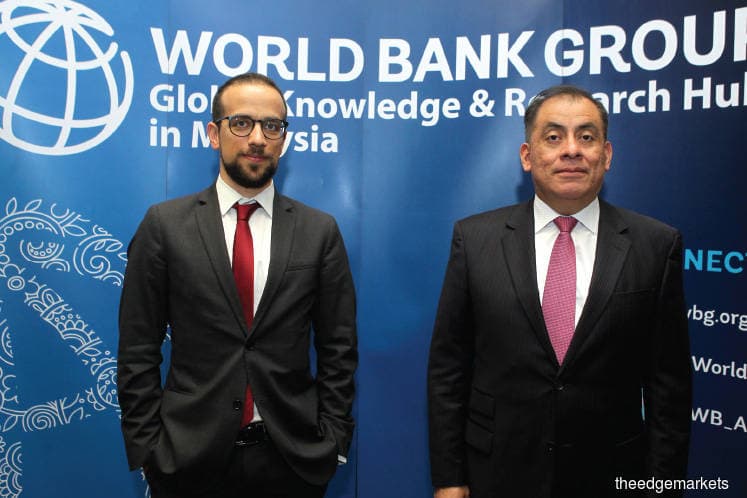
This article first appeared in The Edge Financial Daily on April 16, 2018
KUALA LUMPUR: After missing loan growth targets in 2017, several Malaysian banks have kept expectations more conservative this year, even as Bank Negara Malaysia (BNM) data indicated a moderation in the total outstanding financing growth of 4.1% in 2017 compared with 5.6% in 2016.
The World Bank, however, is unfazed by stagnating loan growth rates in the local banking sector, which have “historically been very high, reflecting demand for credit and financial services”.
“The fact that loan growth rates tend to become flat, or even reverse, is a positive sign,” said Jose de Luna-Martinez, the lead financial-sector specialist at the World Bank, noting that it is good when loan growth stabilises.
In an interview with The Edge Financial Daily, Martinez categorised the Malaysian banking sector as a “mature market”, which is getting crowded for domestic players as “demand has already been met for certain segments, and it is difficult to continue growing.
“In consumer lending [for instance], there might already be too much credit,” he said, highlighting concerns over high household debt, which typically carries higher interest rates by virtue of being short-term debt.
Despite Malaysia’s household debt declining to 84.3% of gross domestic product in 2017, compared with 88.3% a year ago, it remains high by the World Bank’s standards.
As such, banks should be wary of overleveraging by their customers.
“A natural business decision would be to refrain from growing that section of the market because there is a limit to how much you should grow. If you go beyond that limit, the risks are much higher,” Martinez cautioned.
However, other market segments such as housing finance and insurance still have potential to grow, he said, adding that the insurance sector especially still appears under-penetrated.
Slower loan growth could also be explained by the evolution of alternative financing options in Malaysia, especially as businesses have turned away from relying on the banking system towards the domestic capital market.
Such a development is positive, however, as the domestic capital market would be able to act as a “spare tyre” in times of credit crunches during financial crises, according to findings in the Global Financial Development Report (GFDR) 2017/2018 by the World Bank.
“I think Malaysia has a good story to tell in terms of how it developed its domestic capital market to be able to serve small and medium enterprises (SMEs) as well as larger corporations,” Martinez said, pointing also at the availability of regulated crowdfunding platforms and peer-to-peer lending.
The presence of international banks is also an important element in the mix, as they enable a healthy diversification of investors.
For instance, the presence of Chinese banks will only grow in the region due to their infrastructure interests.
“Chinese participation is welcome because the infrastructure needs of Malaysia and across the Asean region are huge,” Martinez added.
Resilient in the face of volatility
The domestic banking sector also appears robust in the face of increasing volatility in global financial markets.
“There will be some pressure [on the financial system] because of the nature of financial volatility and global interconnectedness, but banking systems are much more resilient [compared to where they were during the 2008 global financial crisis],” said Ata Can Bertay, a research economist at the World Bank’s development research group and lead of the GFDR.
Martinez pointed out that it is important to distinguish short-term market noises from strong long-term fundamentals, which are evident in Malaysian banks’ positive capital adequacy ratios, low non-performing loans and strengthening supervisory capacity by the central bank.
“We will continue to see volatility in the upcoming weeks and months, but in the long term, we see that banks are better capitalised,” he said, adding that the banking sector will be supported by the fact that Malaysia’s economy remains fundamentally sound.
On the subject of increasing protectionism in international trade, the findings of the World Bank report indicated that shifting trade flows will have an impact on international banking.
“If countries close themselves to open trade relationships, international banks will have a lower incentive to go into those markets,” Bertay said.
However, the current regional push made by larger Malaysian banks into other Asean countries implies that they are “there to stay, regardless of short- or even medium-term volatility,” said Martinez.
Regulation of cryptocurrencies still a challenge
Central banks still face a large challenge in the regulation of cryptocurrencies, Bertay opined.
“There are more than 1,500 cryptocurrencies in the market and they are very difficult to regulate simply because they each have their own blockchains,” he pointed out.
Martinez said that the turn towards cryptocurrencies could be categorised as a hype, and warned investors to be careful of digital currencies being used as a fundraising platform by smaller companies.
“Those firms should be able to get credit elsewhere, given that we are not in a credit crunch,” he said, noting that SMEs are quite opaque financially and operationally.
Martinez also said that no particular country currently seems to have achieved more success than others at regulating the industry, adding that they are “all in the same boat”.
Meanwhile, although financial technology firms such as Ant Financial and PayPal are value-adding services that “may be expected to get larger in the future”, they are not necessarily perfect substitutes for traditional banking institutions, said Bertay.
“We see [banks and fintech firms] as two different types of players that can complement each other and make the marketplace more competitive,” Martinez said, adding that other industries such as the insurance and security sectors were also being disrupted.
“The domestic banks need to be able to meet that challenge; that is where they need to rapidly react,” he said.